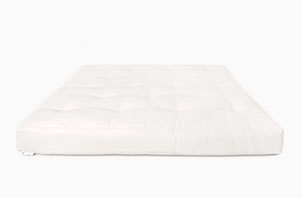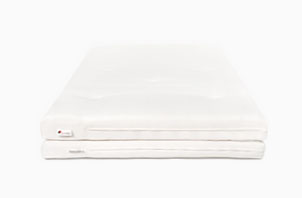Vegan Futon
The original futon from Japan is essentially vegan per se. Although modern European futons of today contain a few additional materials - such as horsehair and especially wool - these materials can be replaced in order to create vegan futon variations. At Futonwerk, all of the futons can also be ordered in vegan. However, we would like to elaborate on two aspects.
First about the firmness: In functional terms, replacing the horsehair with coconut fiber is no problem, because coconut fiber takes care of stabilization and air conditioning just as well as horsehair does - perhaps even better when it comes to air conditioning. However, the futon becomes either slightly or notably firmer with coconut, because the fiber is thicker and more brittle than the hair. It affects thin Shiatsu mats notably, thicker futons only slightly or not at all. In a DW 5.1 or DW 6.0, the difference won't really be noticed much, while in a Zen R2+3 or DX 2 it will make a considerable difference. Even in the thick DX 5 the difference will be rather notable, because the ratio of 3 cm latex plates and 1.5 cm coconut fiber can be felt. All in all the replacement of horsehair with coconut fiber is no problem.
Climate and hygiene: In comparison, the wool isn't replaced as easily. Even though we use organic cotton instead of wool, we could just as well be using hemp or flax fiber. But all of those materials are no real replacement for wool. Aside of being dimensionally stable, the nice, strong, curled fibers of the wool provide a lipid surface surrounded by lanolin - the wool wax. Although 99% of it is washed out, the remaining lanolin protects the fibers, the fleece, the futon against moisture and bacteria build-up, thereby keeping it hygienic and climatically at a nice level. The cotton on the other hand offers no moisture protection and therefore becomes tough and firm over time, worsening the lying comfort notably more than wool over the years. Hemp and flax are firmer per se, and although it is more hygienic, it is also more expensive and doesn't provide sufficient compensation either. Considering that our wool is always in Alpine quality - i.e. from Austrian shepherds rather than large farms from overseas with gruesome conditions - those who live vegan primarily in terms of food, but wear leather clothing or buy their groceries in super markets, should keep this clean virgin wool in the futon.
100% vegan: Lastly, we would like to be fair and tell those vegans who live fully vegan and who are aware of all the production processes that contain animal components (for example for coffee, beeswax/shellac, red wine, gelatine, ...) that our vegan futons are not tested and are therefore only part of the 'entry level vegan class'. We don't know (yet) whether all components are clean. We are only a small team working through such processes step by step, because it isn't as simple as asking the preliminary suppliers seeing that they often don't know exactly themselves.
If this vegan movement continues to spread, such knowledge will become wider and in turn bring good contributions to the social awareness.







